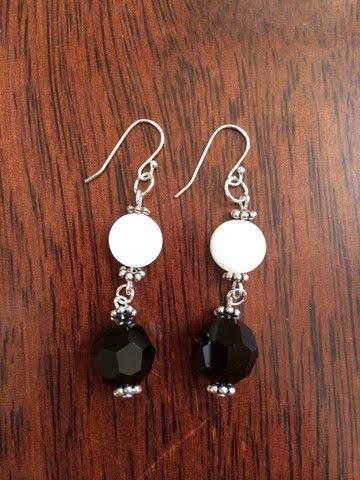Introduction
Sterling Silver Jewelry is a popular and fashionable choice for jewelry due to its attractive finish and relative affordability. It’s made from 92.5% pure silver, with the remaining 7.5% composed of other metals like copper or zinc. While it can be worn in many occasions, there are pros and cons to wearing it while showering that should be considered before opting to do so.
Pros: Firstly, sterling silver is usually made in exquisite designs that can make a great addition to any outfit – even one you wear in the shower! Another pro is that the slight waterproof nature of sterling silver means that it won’t tarnish as quickly than other jewelry in wet environments, creating an opportunity for longer wear times with minimal maintenance.
Cons: On the other hand, contact with chlorine found in some water supplies can cause the appearance of silver to degrade over time due to its reaction with compounds present in some pool and sea water. Furthermore, when exposed to soaps and moisturizing products used in showers, sterling silver may tarnish faster than if exposed to air over time by abrasion or chemical reactions. This means extra work must be done when caring for your jewelry after each shower.
What is Sterling Silver? Definitions and Characteristics
Sterling Silver is an alloy of silver consisting of 92.5% pure silver and 7.5% other metals, usually copper. It has a range of appealing characteristics that make it a popular choice for jewelry both in America and around the world. Sterling Silver has excellent malleability, meaning it can be easily shaped into desired forms such as rings, bracelets, necklaces, etc. It is also very durable compared to other precious metals,making it resistant to scratching or denting over time. Finally, sterling silver jewelry is quite affordable when compared to golds and other precious metals, making it a great option for those looking for quality but who are on a budget.
When considering whether you can wear your sterling silver jewelry in the shower or not, a few things must be considered: exposure to chlorine or hot water could result in tarnishing (a discolored look) over time; this type of damage from exposure to these elements may not be reversible. Also, chemicals used in soaps and shampoos are known to weaken the properties of sterling silver over time if they come into contact with the metal repeatedly and on a regular basis. Therefore, while many people do wear sterling silver in the shower on occasion without any issue, it is best to err on the side of caution and not bring your sterling silver jewelry into contact with chlorine or hot water regularly to avoid possible damage down the line.
Benefits of Wearing Sterling Silver in the Shower
Wearing sterling silver jewelry in the shower has many advantages, especially for those that suffer from contact dermatitis or sensitive skin. As sterling silver is a hypoallergenic material, it is less likely to cause any reaction or irritation when exposed to water and moisture. Sterling silver jewelry also does not discolor due to the presence of chlorine and other chemicals contained in tap water. These properties make sterling silver an ideal choice for individuals looking for a long-lasting and durable metal to wear in the shower.
In addition to its practical benefits, wearing sterling silver jewelry in the shower also has plenty of fashion appeal. Sterling silver has a bright white luster that stands out beautifully against all skin tones, making it popular among fashionistas looking for an elegant accent piece to their look. Because sterling silver pairs with almost any color and style, it can be easily adapted into whatever outfit or mood you’re looking for. Sterling silver jewelry is likely to stay beautiful and keep its pristine appearance even after wear, making it a great choice for frequent outfit changers.
Potential Risks of Wearing Sterling Silver Jewelry in the Shower
The short answer to this question is that it is not recommended to wear sterling silver jewelry in the shower. Sterling silver, although a durable and beautiful metal, contains small amounts of copper which can cause tarnishing when exposed to water, especially hot water. Furthermore, wearing your sterling silver jewelry in the shower can also increase the risk of metal oxidation. Oxidation causes the sterling silver jewelry to turn an off-color shade or black color. Bacteria and soap residue can also accumulate on and around your jewelry if it’s exposed to moisture regularly. This bacteria can potentially work its way into delicate parts of your jewels through cracks or links and cause damage as well as discoloration over time. Finally, steam from hot showers may actually weaken metals and reduce thestrength of the piece, making it susceptible to bending out of shape or even breaking depending on how much exposure your piece has had.
Maintenance Tips for Wearing Sterling Silver Jewelry in the Shower
No, wearing sterling silver jewelry in the shower is not recommended as it can severely damage or tarnish the jewelry. Exposure to hot water, steam, and chlorine can cause silver to become dull and discolored. If you are intent on wearing sterling silver in the shower there are a few things you can do to reduce the risk of damage. Make sure to use a gentle soap and warm water to clean your jewelry and avoid using any harsh chemicals or sprays as this could cause further damage. Also, avoid allowing it to be submerged for prolonged periods of time as this can increase the risk of corrosion. If possible try to take off your jewelry when getting into the shower so that it won’t be exposed to too much moisture at once. Additionally, consider investing in a jewelry cleaning solution specifically designed for silver, which can help prevent tarnish and keep your pieces looking their best even when you wear them in the shower.
Alternate Options for Wearing Sterling Silver Jewelry in the Shower
There are several alternatives available for wearing sterling silver jewelry in the shower. Many products on the market offer protection against moisture, sweat and humidity. These include anti-tarnish bags, tarnish strips and wipes, jewelry boxes with humidifiers, desiccant sachets and wax coatings designed to repel water.
When choosing a product, consider the type of sterling silver jewelry you have – natural stones such as turquoise or lapis should not be kept in airtight containers for extended periods of time due to their potential for discolouration – as well as its environment: bathroom steam may amplify oxidation processes so should be avoided wherever possible.
The most effective precaution when showering with sterling silver jewelry is to take it off before getting into the shower or bathtub; this eliminates any contact with water thus preventing rusting and/or tarnishing. If this is not an option, however, other techniques exist which may help reduce damage caused by contact with moisture. It’s best to wipe down wet jewelry immediately with a soft cloth – preferably one made of microfiber material – which will efficiently remove all droplets without rubbing off any polish or surface patina deposits onto it; try also reapplying any polishing/tarnish preventing/protective solutions or coatings where applicable after drying off (this can include commercial restoration treatments).
Summary and Recap
No, you should not wear sterling silver jewelry in the shower. Sterling silver is a relatively soft metal, and prolonged exposure to water can cause it to corrode or tarnish easily. Chlorine, which is present in many showers, can also speed up this process. The warm wet environment of a shower can also cause sterling silver jewelry to change its shape or become brittle over time, becoming more likely to break or lose its structure, color and shine. Additionally, frequent wearing of sterling silver jewelry while showering may increase the risk of skin irritation. For these reasons, it is not recommended to wear sterling silver jewelry in the shower.
Conclusion
When choosing to wear sterling silver jewelry in the shower, there are several considerations you should take into account. First, Sterling silver is a soft metal that can tarnish easily when exposed to water. For this reason, it’s important to ensure your sterling silver jewelry is properly sealed with a protective coating such as lacquer before showering. Additionally, it’s best to avoid wearing heavy sterling silver jewelry and opt for lighter designs since heavier pieces can cause the metal to become malleable. Finally, if you decide to wear necklaces or other spa/pool-appropriate accessories in the shower, choose pieces made from treated metals. Stainless steel and titanium are good examples of non-tarnishing metals that retain their shine even after countless showers.

Welcome to my jewelry blog! My name is Sarah and I am the owner of this blog.
I love making jewelry and sharing my creations with others.
So whether you’re someone who loves wearing jewelry yourself or simply enjoys learning about it, be sure to check out my blog for insightful posts on everything related to this exciting topic!





